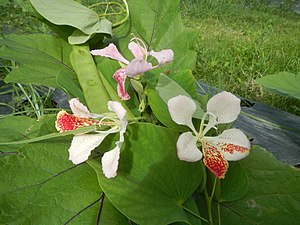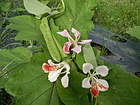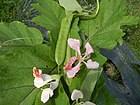Note: This is a project under development. The articles on this wiki are just being initiated and broadly incomplete. You can Help creating new pages.
Difference between revisions of "Bauhinia purpurea"
| Line 1: | Line 1: | ||
[[File:02218jfBauhinia purpurea flowers Bulacanfvf 03.jpg|thumb|right]] | [[File:02218jfBauhinia purpurea flowers Bulacanfvf 03.jpg|thumb|right]] | ||
| + | '''Bauhinia purpurea''' is an erect, evergreen shrub. it can grow 7 - 10 metres tall. The tree has a wide range of local uses. It should also make an excellent pioneer species and is commonly cultivated as an ornamental through much of the tropics, being valued especially for its handsome flowers. | ||
==Uses== | ==Uses== | ||
{{Uses|}}, {{Uses|}}, {{Uses|}}, {{Uses|}}, {{Uses|}}, {{Uses|}}, {{Uses|}}, {{Uses|}}, {{Uses|}}, {{Uses|}}, {{Uses|}}. | {{Uses|}}, {{Uses|}}, {{Uses|}}, {{Uses|}}, {{Uses|}}, {{Uses|}}, {{Uses|}}, {{Uses|}}, {{Uses|}}, {{Uses|}}, {{Uses|}}. | ||
==Parts Used== | ==Parts Used== | ||
| − | {{Parts Used|}}, {{Parts Used| | + | {{Parts Used|Seeds}}, {{Parts Used|Flower buds}}, {{Parts Used|Flowers}}, {{Parts Used|Root}}. |
==Chemical Composition== | ==Chemical Composition== | ||
| Line 16: | Line 17: | ||
===Dravya=== | ===Dravya=== | ||
===Rasa=== | ===Rasa=== | ||
| − | |||
===Guna=== | ===Guna=== | ||
| Line 29: | Line 29: | ||
==Habit== | ==Habit== | ||
| − | {{Habit|}} | + | {{Habit|Evergreen tree}} |
==Identification== | ==Identification== | ||
| Line 51: | Line 51: | ||
==How to plant/cultivate== | ==How to plant/cultivate== | ||
| − | <ref name="How to plant/cultivate"/> | + | A plant of subtropical to tropical regions where it can usually be found at elevations from 500 - 2,000 metres, exceptionally to 3,000 metres.<ref name="How to plant/cultivate"/> |
==Commonly seen growing in areas== | ==Commonly seen growing in areas== | ||
| − | {{Commonly seen|}}, {{Commonly seen|}}, {{Commonly seen|}}, {{Commonly seen|}}, {{Commonly seen|}}. | + | {{Commonly seen|Mixed deciduous forests}}, {{Commonly seen|On hill slopes}}, {{Commonly seen|}}, {{Commonly seen|}}, {{Commonly seen|}}. |
==Photo Gallery== | ==Photo Gallery== | ||
Revision as of 12:34, 1 April 2020
Bauhinia purpurea is an erect, evergreen shrub. it can grow 7 - 10 metres tall. The tree has a wide range of local uses. It should also make an excellent pioneer species and is commonly cultivated as an ornamental through much of the tropics, being valued especially for its handsome flowers.
Contents
- 1 Uses
- 2 Parts Used
- 3 Chemical Composition
- 4 Common names
- 5 Properties
- 6 Habit
- 7 Identification
- 8 List of Ayurvedic medicine in which the herb is used
- 9 Where to get the saplings
- 10 Mode of Propagation
- 11 How to plant/cultivate
- 12 Commonly seen growing in areas
- 13 Photo Gallery
- 14 References
- 15 External Links
Uses
[[:Category:Ayurvedic Herbs known to be helpful to treat |]], [[:Category:Ayurvedic Herbs known to be helpful to treat |]], [[:Category:Ayurvedic Herbs known to be helpful to treat |]], [[:Category:Ayurvedic Herbs known to be helpful to treat |]], [[:Category:Ayurvedic Herbs known to be helpful to treat |]], [[:Category:Ayurvedic Herbs known to be helpful to treat |]], [[:Category:Ayurvedic Herbs known to be helpful to treat |]], [[:Category:Ayurvedic Herbs known to be helpful to treat |]], [[:Category:Ayurvedic Herbs known to be helpful to treat |]], [[:Category:Ayurvedic Herbs known to be helpful to treat |]], [[:Category:Ayurvedic Herbs known to be helpful to treat |]].
Parts Used
Seeds, Flower buds, Flowers, Root.
Chemical Composition
Common names
| Language | Common name |
|---|---|
| Kannada | |
| Hindi | |
| Malayalam | |
| Tamil | |
| Telugu | |
| Marathi | |
| Gujarathi | |
| Punjabi | |
| Kashmiri | |
| Sanskrit | |
| English |
Properties
Reference: Dravya - Substance, Rasa - Taste, Guna - Qualities, Veerya - Potency, Vipaka - Post-digesion effect, Karma - Pharmacological activity, Prabhava - Therepeutics.
Dravya
Rasa
Guna
Veerya
Vipaka
Karma
Prabhava
Habit
Identification
Leaf
| Kind | Shape | Feature |
|---|---|---|
Flower
| Type | Size | Color and composition | Stamen | More information |
|---|---|---|---|---|
| {{{5}}} |
Fruit
| Type | Size | Mass | Appearance | Seeds | More information |
|---|---|---|---|---|---|
Other features
List of Ayurvedic medicine in which the herb is used
Where to get the saplings
Mode of Propagation
[[:Category:Index of Plants which can be propagated by |]]
How to plant/cultivate
A plant of subtropical to tropical regions where it can usually be found at elevations from 500 - 2,000 metres, exceptionally to 3,000 metres.[3]
Commonly seen growing in areas
Mixed deciduous forests, On hill slopes, [[:Category:Herbs that are commonly seen in the region of |]], [[:Category:Herbs that are commonly seen in the region of |]], [[:Category:Herbs that are commonly seen in the region of |]].
Photo Gallery
References
External Links
- [ ]
- [ ]
- [ ]
- Ayurvedic Herbs known to be helpful to treat
- Herbs with Seeds used in medicine
- Herbs with Flower buds used in medicine
- Herbs with Flowers used in medicine
- Herbs with Root used in medicine
- Habit - Evergreen tree
- Index of Plants which can be propagated by
- Herbs that are commonly seen in the region of Mixed deciduous forests
- Herbs that are commonly seen in the region of On hill slopes
- Herbs that are commonly seen in the region of
- Herbs
- Pages without herbs images





